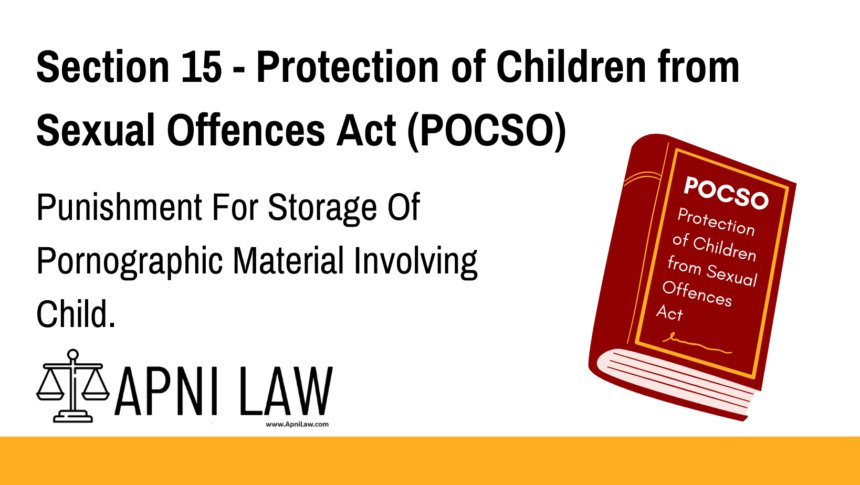Code: Section 15 POCSO Act
(1) Any person, who stores or possesses pornographic material in any form involving a child, but fails to delete or destroy or report the same to the designated authority, as may be prescribed, with an intention to share or transmit child pornography, shall be liable to fine not less than five thousand rupees and in the event of second or subsequent offence, with fine which shall not be less than ten thousand rupees.
(2) Any person, who stores or possesses pornographic material in any form involving a child for transmitting or propagating or displaying or distributing in any manner at any time except for the purpose of reporting, as may be prescribed, or for use as evidence in court, shall be punished with imprisonment of either description which may extend to three years, or with fine, or with both.
(3) Any person, who stores or possesses pornographic material in any form involving a child for commercial purpose shall be punished on the first conviction with imprisonment of either description which shall not be less than three years which may extend to five years, or with fine, or with both and in the event of second or subsequent conviction, with imprisonment of either description which shall not be less than five years which may extend to seven years and shall also be liable to fine.
Explanation of Section 15 POCSO
Section 15 of the Protection of Children from Sexual Offences Act, 2012, criminalizes the act of storing or possessing pornographic content involving children. This provision acknowledges that even passive acts like storage or possession can contribute to the child pornography ecosystem and must be treated with severity.
The section classifies the offense based on intent and purpose, prescribing different levels of punishment:
- Failing to report or delete child pornography with intent to transmit it
- Storing it for the purpose of transmission, display, or distribution
- Storing it for commercial purposes
This approach ensures that individuals who contribute to the circulation of such material—whether directly or indirectly—are held accountable.
Key Provisions
- Storage or possession with intent to share: Minimum fine of ₹5,000 (₹10,000 for repeat offenses)
- Storage for transmitting, displaying, or distributing (except for legal or reporting purposes): Up to 3 years imprisonment or fine or both
- Storage for commercial purposes:
- First conviction: Minimum 3 years imprisonment (up to 5 years) or fine or both
- Second/subsequent conviction: Minimum 5 years (up to 7 years) imprisonment and fine
Illustration
Example 1: Failure to Report
A person receives a video involving child pornography in a chat group but neither deletes it nor reports it to authorities. This inaction, coupled with the intent to possibly share it later, makes the person liable under Section 15(1) and punishable with a fine of not less than ₹5,000.
Example 2: Stored for Transmission
A man downloads child pornographic content with the intent to share it with others online. He may be punished under Section 15(2) with imprisonment of up to 3 years or a fine or both.
Example 3: Stored for Commercial Gain
A person saves several such videos with the intention to sell or monetize them through dark web platforms. On first conviction, they face imprisonment of 3 to 5 years under Section 15(3). On a second conviction, the penalty increases to a minimum of 5 years up to 7 years with a fine.
Common Questions & Answers
1. Is merely storing child pornographic content a crime?
Yes. Even without distributing it, simply storing such content with intent to share or use it for commercial purposes is punishable under this section.
2. What if someone unintentionally receives such material?
If the person deletes it or reports it to the authorities immediately, they are not held liable. The law targets those who retain the content and fail to act appropriately.
3. What is meant by “commercial purpose” in this context?
Using the content to earn money, either through direct sale, subscription services, or traffic monetization (such as through ad revenue), qualifies as commercial use.
4. Can someone be punished for not deleting such content even if they did not share it?
Yes. If the individual keeps the material with intent to transmit and does not delete or report it, they can be fined under Section 15(1).
5. Are there exceptions for legal or official use?
Yes. Use of such content strictly for court proceedings or as part of reporting to authorities is exempt from prosecution under Section 15(2).
Conclusion
Section 15 of the POCSO Act is a crucial provision that addresses the possession and storage of child pornographic material. It recognizes that mere storage—if motivated by intent to distribute, display, or profit—can cause significant harm and must be punished. The law aims to create strong deterrents against digital exploitation of children and ensure that all contributors to such abuse are brought to justice.
For complete legal resources and updates on child protection laws, visit ApniLaw.








